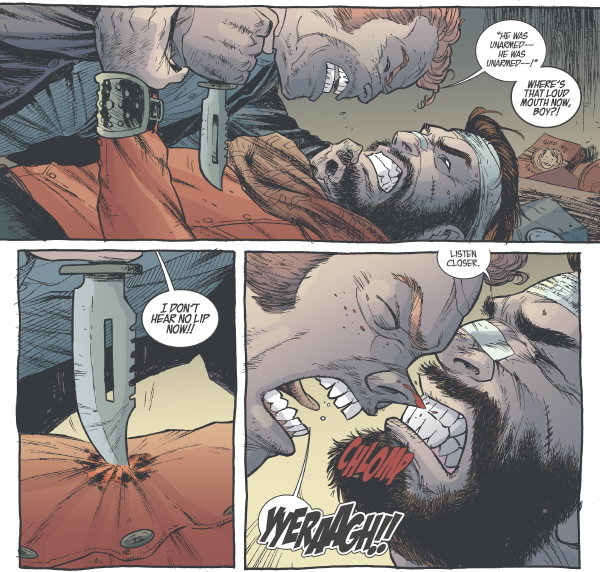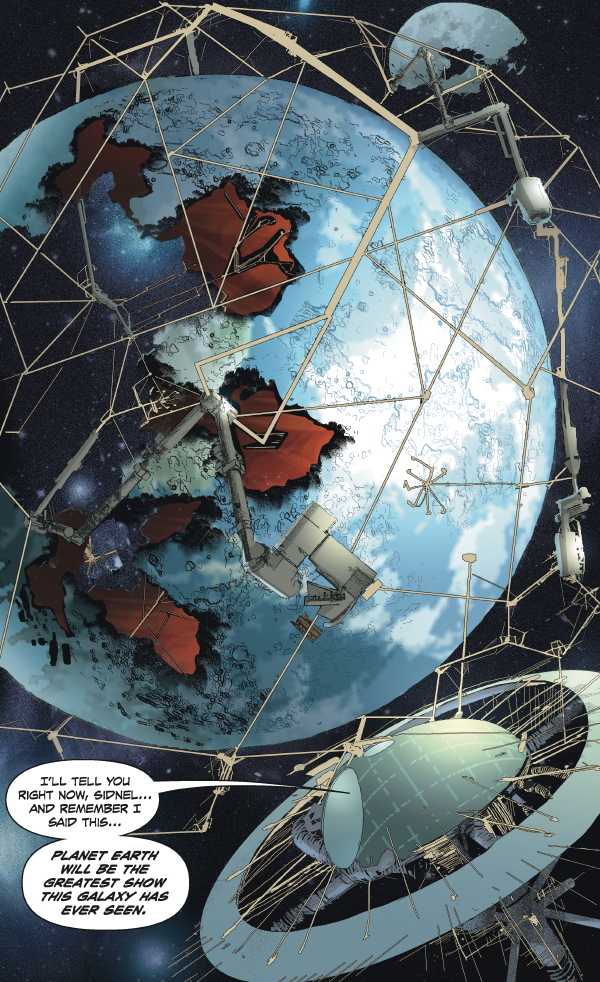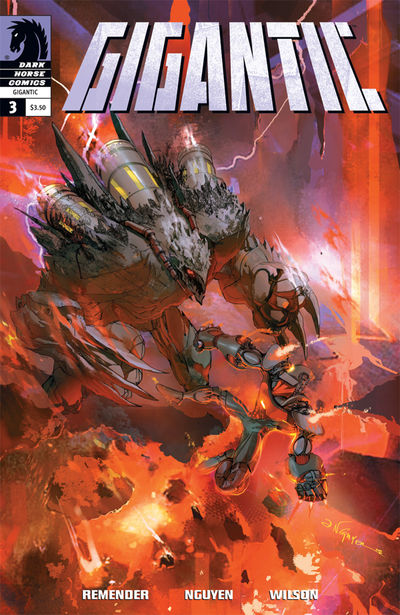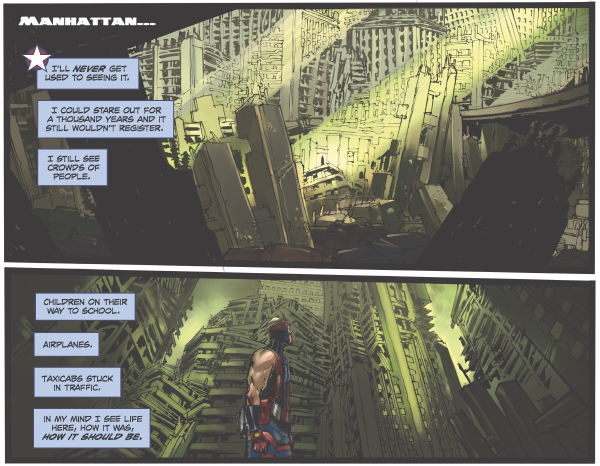 Over-worked and candid, Rick Remender answers our questions about his latest project -- Gigantic -- and makes some late-night predictions about the future of America. Just in time to sway some undecided voters!
Over-worked and candid, Rick Remender answers our questions about his latest project -- Gigantic -- and makes some late-night predictions about the future of America. Just in time to sway some undecided voters! Dark Horse: You now have three ongoing series with Dark Horse: Fear Agent, The End League, and the new series Gigantic. How do you come up with so many ideas, characters, and voices without spreading yourself too thin?
Rick Remender: I work fifteen to seventeen hours a day, nearly seven days a week. I’ve kept this schedule going on four years now. I hit a point about five years ago where I'd spent an entire year doing pitches, but hadn’t sent any out for fear of mass rejection. Here I had all of these pitches done, all of these ideas cooked up -- Fear Agent, The End League, Night Mary, Strange Girl, and many others -- but nothing had been done with them. So I just woke up one day and made my mind up to do whatever I had to do to get them all produced. As it turns out, what I had to do was to endlessly type for half a decade.
Much of what I’m currently working on has been in development since that period, so the concept stage and outlines have been done for some time, freeing me to focus on the fine-tuning in scripting. No way I could deal with my current workload had I not laid out the road maps well in advance. Having a road map makes it possible for me to multitask, hopping from one book to another, fairly seamlessly, without any detriment to the story. I have the foundation done, so now, as long as I can wrap a script every five to six days, hell or high water, I can keep the trains running on time.
Am I being worn thin? Yes. I don’t allow it to affect the work though, to the exclusion of all other priorities in life. Once I get through the next twelve months of insane deadlines, I swore to my wife, I’ll dial my schedule back a bit. At this point I don’t know if I’m actually capable of following through on the promise. Telling brilliant artists what to draw is a pretty great job.
DH: Heath Huston just can’t seem to catch a break in the Fear Agent series. Has he been able to stay alive thanks to luck or ability?
RR: Hmm . . . Well, we have seen Heath die a few times so maybe it’s just luck. But his luck also seems to suck a giant corncob, so . . . a bit of both. He sort of irks by always by the skin of his teeth . . . occasionally via luck, occasionally via badassery.

DH: What is it about a character like Heath Huston, who’s constantly seeing things turn against him, that is so appealing to readers and to you as an author?
RR: Well, you have to like a character to want to see him overcome the adversity he’s up against, and I think the key to likability is frailty . . . honest human weakness. We’re all walking sacks of damage, insecurity, and false ego, and those of us who are in touch with that aspect of our nature respond well to characters without the pretense of some fabricated perfection or ingrained natural heroism. Identifiable weakness ingratiates a character to us. To see someone who is simply a damaged human behave heroically has an effect. It means something. To see a “hero” act “heroically” means next to nothing; it’s expected of him or her. I think Fear Agent readers really like Heath and that’s why they want to see him win . . . at least once.
DH: Is the basic concept of Gigantic that all life on Earth, and even the planet itself, are an elaborate stage set for an intergalactic television show? Or is there something else going on that readers will see as the story progresses?
RR: That’s the big question. The series’ initial thrust will be the slow unraveling of the mystery of who Gigantic is and why he’s constantly being engaged in absurd and seemingly staged large-scale battles across our globe. Regardless of his attempt to stop the ensuing destruction and protect humanity, many of the attacks lead to the flattening of dozens of major cities across the globe, setting all governments to the singular task of annihilating this alien monster. As the size of the robots and bounty hunters sent to fight him continues to increase, so does the wholesale destruction of the cities of men. Gigantic’s guilt and sorrow exponentially increase as he begins to realize that no matter where he goes, death and destruction inevitably follow him.

DH: I’ve noticed the story also examines how American culture is heavily based on consumerism. What do you hope to accomplish by working with this subject?
RR: It’s more about the effect our modern entertainment has than consumerism, though the two aren’t mutually exclusive. Oddly, over the past five years, as I’ve transitioned to full-time writer, I find that after scripting for ten or twelve hours a day the last thing I want to do is read more words. Instead I play Xbox and voraciously consume anything on television worth a shit. If I’d spent the time I’ve clocked in rewatching Twin Peaks over the years, I could have written a novel. Perhaps this unwritten novel would have been about a sea horse who can see backwards in time, but no one appreciates his gift, leaving him cursed to spend his life knowing what just happened but with no one to listen or even show him the courtesy of opening a door for him. It would have been poignant and shown us all that we have something to learn from the world. Your loss, I guess.
Add up the time I’ve spent in the worlds of Deadwood, The Sopranos, Six Feet Under, Arrested Development, Freaks and Geeks, Mad Men, Weeds, Band of Brothers, and Survivor, and I bet I could’ve learned a second language. Add to that the many hundreds of times I’ve watched The Simpsons seasons 3–10 and the time spent playing SOCOM, Call of Duty, or GTA, and I could have cured cancer or discovered an energy source powerful enough to make time travel possible. If you haven’t sunk into the same bad habits, with the aforementioned story shows, video play games, or cartridge units like them, then congratulate yourself for being better than me and go bury yourself in a pile of self-worth. A$$#@!*.
So, getting to my point, Gigantic was born while mulling these two things over. As we advance, our population becomes more and more dependent on entertainment. So how far would this trend go, say, in a race that had been around for a million years? What if you exponentially multiply the current trajectory of reality television? I think you can begin to cook up some fairly interesting scenarios following that idea.
DH: Eric Nguyen, the artist on Gigantic, has created some truly beautiful covers and pages. How did the two of you team up?
RR: I wanted to do a book with giant robots and monsters destroying cities and needed someone with the ability to grasp scope, smooth storytelling, and Kirby-level dynamics. I love working with Eric Nguyen for just those three reasons, so it was a natural fit. Eric and I created a series at Image called Strange Girl together and we’ve also collaborated on an issue of Fear Agent, so we’ve got history. At the end of the day this book couldn’t work without mind-bendingly super-duper art. It’s a visual story, and if I didn’t have someone of Eric’s caliber, it wouldn’t work. Eric is absolutely on the cutting edge; there isn’t another artist in comics like him. It’s been a privilege to come up with him, and to see more and more people catch on to his brilliance. He’s in the camp of guys I started doing comics with and also hope to always be doing comics with.

The real trick was getting the color just right. So much of what Eric does is defined by color. If you don’t have a groundbreaking and brilliant colorist, s#*! isn’t going to fly. Matt Wilson was recommended to me by Ivan Brandon and I’m in love with the guy . . . er, his coloring, anyway. I signed him up to color The End League and Gigantic in the same week and plan on attaching him to as many of my books as possible. He’s one of the next greats, partially due to his time working for Fear Agent colorist and all-around color master Lee Loughridge.
DH: The new covers and art for The End League, drawn by Eric Canete, look much darker than the earlier issues. Personally I think his long, stark lines give the series a great apocalyptic feel. How did you decide to take him on as the new illustrator?
RR: More like how did I manage to get him. Eric is one of the most sought-after artists in animation and more and more in comics as well. He’s an absolute genius; anyone who disagrees doesn’t know anything about art. Once it was clear that in order to get the book on some kind of a normal shipping schedule there would need to be an art change, Eric was my first choice. So far the issues we’ve done together are some of the high points of my career. He sets more mood with a simple background than most artists achieve with a human face. When Soldier American strolls through the remains of New York in issue #4, Eric didn’t focus on the character’s face; he focused on giving the city itself a mood. The light cutting through the dead buildings, seas of empty cars still stuck in traffic . . . to let it reflect the desolation and emptiness of the end of the world, and he absolutely succeeded. Total genius. I wish to God I could convince him to stay in comics forever. Our industry is a better place having him in it; it’s been an absolute pleasure.

DH: Is there a common thread between all of the comics you write, or do you try to keep them as separate from each other as possible?
RR: I tend to destroy the Earth. Fear Agent, The End League, Strange Girl, Doll and Creature, Sea of Red . . . Many of my books begin or end with everything going to pot. I grew up during the cold war and endlessly watching Road Warrior . . . Guess it’s just ingrained.
DH: Many of your stories deal with a future in peril. What, in your opinion, is the greatest threat to the Earth today?
RR: I fear Republican thinking. It’s so antiquated and has failed us so utterly it’s frightening to me we still have a population who see it as a rational choice. I fear the environmental catastrophe we’ve caused has passed the point of being solvable, even if we were trying. I fear the middle class is disappearing, wages and quality of life declining, while corrupt corporations like Wal-Mart place the burden of their employees’ health care on the taxpayers via welfare services. I fear the arrogance of the “USA #1” mentality; I fear it will ultimately hurl us over a cliff and into a sea of fat mediocrity as we chant our own praises. I fear class warfare is inevitable when 1% of the population owns 40% of the wealth. I fear people who don’t feel ashamed of the hundreds of thousands of civilian human beings who died based on Bush’s lies and incompetence, as if the fact that they aren’t American and thus “really good” negates the significance of their lives. I fear the divide in this country will never be closed as the tactics of the right wing lose sight of all ethical boundaries.
All that and more can be found in my new book -- I’m Pretty Fearful: Memoirs of a Catastrophist.
DH: Would you rather be a superhero on Earth or an alien exploring the galaxy?
RR: Alien superhero.
(Be sure to catch Rick Remender’s special appearance at TFAW’s Portland Store on November 6th at 6:00pm to get your copy of Gigantic #1 signed!)